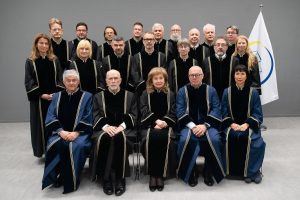
Thirty years after the Srebrenica genocide. The victims’ legal odyssey
Thirty years after the Srebrenica genocide. The victims’ legal odyssey Written for the componente: Armed conflicts Thirty years after
Written for the component:
Peace building and transitions

The sense of public ownership is not of secondary importance for an international tribunal, especially when it is located distantly from the affected country. Particularly, when these tribunals are based abroad, they are often perceived as alien; in such cases, it is necessary to establish communication between the tribunal, the victims and the community.
The proximity of the hybrid justice with the local population was for the first time promoted by the Security Council when it established the ICTY, located in The Hague. At that time the mission was accomplished also by an Outreach Program, fundamental to achieve the Tribunal’s mandate. The program was to maintain a « link between the work of the Tribunal and the people of the former Yugoslavia », so that people in the region could share a consensus on the fact that the Court was legitimate. « They must know, understand and appreciate the work of the Tribunal ». The Outreach Program of the ICTY, launched in 1999, should face the misrepresentations and misunderstanding that affected the Tribunal in the local perception. The intentional propaganda instrument was increasing discontent within the different ethnic groups and this discredited the Tribunal.[2] The then President understood that it was essential for the process of legitimization of the Tribunal to convince the population that it had been created in their same interest.
Unfortunately, in the case of the ICTY, differently from the following tribunals, the Outreach Program started quite late, six years after the beginning of its functioning and this made possible a persistent defamatory campaign by the local media and hostile politicians. Today, such campaigns are more controlled concerning other judicial organs of the same character because the Outreach Programs start very soon, at the beginning of the tribunal’s activity, but this has not eliminated the negative propaganda at all.
The Kosovo Specialist Chambers (KSC) is a hybrid tribunal which suffers the lack of legitimacy by the local population. In this case, non-only the Court should engage in Outreach but also the Government of Kosovo in order to explain the working methods of the Court and bolster its local ownership. Unfortunately, the contradictory behaviour of the Government of Kosovo does not justify the previous support and the present reluctance or hostility towards the KSC. The Government should explain the KSC to its citizens to promote local support. Such ambiguous approach of the Government risks causing inter-community tensions, civil unrest and political instability.
Since the beginning of its activity, the KSC was engaged in an effective Outreach strategy, through the Public Information and Communication Unit, but also the Presidency and the Registry are very involved in communication activities. Public meetings and events are organized in the siège of the Court, in Kosovo and online through a YouTube channel. This activity is vital for the KSC that has faced with ominous omens concerning the impunity of the most prominent defendants, who would have received guaranties that they won’t be prosecuted because only low-level figures and not the “big fishes” will be judged. According to this narrative, the Court would prosecute only direct perpetrators instead of the commanders.
In reality, this is not true. In fact, in June 2020, the Prosecutor announced he had filed a ten-count indictment charging President Hashim Thaçi, leader of the Kosovo Liberation Army (KLA) between 1998 to 2000, along with Democratic Party of Kosovo chairman Kadri Veseli and nine others, with crimes including murder, persecution, forced disappearances, torture and other crimes allegedly committed against hundreds of victims, who were considered by the KLA as traitors of the independentist cause.[3] Following this announcement, President Thaçi withdrew his travel to Washington, accusing the KSC to want to rewrite the History.
Lastly, on 30 November 2020, the Pre-Trial Chamber of the KSC confirmed its first indictment, where the Specialist Prosecutor’s Office argued that the crimes were committed pursuant to a joint criminal enterprise (JCE). In confirming the indictment, the Chamber applied JCE in all forms, even if it seems that any reference to JCE is absent in the KSC’s Statute nor in the Kosovo Criminal Procedure Code – particularly JCE III –and it was not customary international law applicable at the time the crimes were committed. The confirmation decision reveals that there were public statements, publication and other readily accessible material that warned of, and/or encouraged the commission of the crimes alleged. As Pre-Trial Judge Nicolas Guillou found, the evidence establishes a well-grounded suspicion to satisfy an objective observer that Messrs. Hashim Thaçi, Kadri Veseli, Rexhep Selimi and Jakup Krasniqi committed the alleged crimes.
Many critics underline that it took nearly two-decade to initiate prosecutions for systematic and widespread crimes, raising concerns about the availability and reliability of evidence, in many cases lost, compromised, or manipulated and after witnesses’ memories has faded or influenced. 20 years after the commission of the alleged crimes are not a reasonable time, meaning to deny the accused expeditious proceeding. According to these arguments, it is fundamentally unfair to the accused to wait until the evidence is uncertain, unavailable, untrustworthy. The same criticisms involve victims, because justice delayed is justice denied .
For other opponents, the proceedings against the KLA heroic combatants would exacerbate societal anger, feed political instability, provoke new tensions between Albanian and Serb communities in Kosovo, cause a fresh outbreak of nationalism or Islamic fundamentalism and ultimately, worsening the Kosovo-Serbia dialogue. Furthermore, the new Court would be seen with disillusion by the Serb victims who have lost faith in judicial mechanisms after the failure of previous international and national judicial mechanisms. To sum up, a catastrophic forecast accompanies the KSC at the beginning of its activity.
At the present, the KSC enjoys international support, particularly among EU, that has great expectations about their adequacy and appropriateness to pursue their purposes; on the opposite, they suffer a lack of sufficient domestic support, especially among Kosovo’s Albanian community, that perceives them as an illegitimate foreign imposition and a body unfairly focused on Albanians. The Court is perceived as a not necessary organ, whose working methods are unclear, having competence on crimes denied by the Albanian ethnic group, who see the KLA accused leaders only as freedom fighters, refusing their classification as criminals.
There is a perception that the proceedings will not produce an effective result also because the trials will take place after more than twenty years and the witnesses will be inaccurate in their memories. Most of all, due to widespread endemic corruption in Kosovo, there is a belief that witnesses will be intimidated and thus forced to deny the allegations, as it happened in similar trials against KLA leaders before the ICTY. Finally, the Court is seen as an imposition in exchange to obtain Kosovo’s international integration and such extortion would arise social anger, frustration, nationalist resentments intra and inter-ethnic tensions and hostility towards the international community.
Some concerns involve the security of witnesses, so that they feel encouraged to testify, as occurred on 14 January 2019, when the Court questioned Rrustem Mustafa, a former commander of the KLA. This aspect could fight the diffidence and insecurity of people. Within the main objectives of the KSC there is the capacity to fulfil the gaps and avoid the failures of the predecessor, the ICTY, in protecting witnesses. In that case, a major problem was convincing witnesses to testify, while protecting them from intimidation and interference. In fact, “the reasons for establishing KSC are more related to the witness protection” rather that the possible corruption in the domestic judicial system.
In order to avoid and prevent any risks of intimidation and killing of witnesses, as occurred before the ICTY, the KSC have arranged a very serious and highly securitized protection program. There are rigorous measures to guarantee the safety of witnesses and victims, along with their physical and psychological well-being, dignity and privacy. They enjoy full privileges and immunities from legal proceedings concerning their statements and are not subjected to immigration restrictions for attending the Court’s sessions. Many protective measures are ensured by the KSC, such as hiding their identity, giving testimony in private and closed Court sessions, and one-way closed-circuit video links to keep the location of witness from being known. The Rules of Procedure and Evidence provide that reasonable reparations are granted to victims from accused who have been declared guilty or has plead responsible for a crime which has directly resulted in harm to the victims.
Unfortunately, although these strict provisions and serious measures, in September 2020, thousands of alleged war crimes documents were taken away from the Office of Prosecutor and delivered anonymously to the KLA War Veterans’ Organization. The files included the names of protected witnesses in cases at the KSC. The head of the War Veteran Organization, Hysni Gucati, claimed the files proved that the Specialist Chambers is biased against Kosovo Albanians and “established to fulfil Serbia’s will“. This illegal action shows how the work difficult the KSC´s job is in such hostile climate of resentment, accusation, and boycotts.
There is a debate on the future achievements of the Court. It is discussed if this Court will contribute to truth, justice and reconciliation, if the verdicts will be considered truthful and accepted by the public, if there will be public perception and understanding of the trials and if the Court’s work will promote ethnic dialogue and mutual acceptance. All these factors will be verified once the Court will start judicial proceedings. At the moment, it is not possible a prognostic judgment or a redde rationem neither in a positive sense not in a negative one. It is not possible to forecast if the KSC will have a positive or negative societal impact on Kosovo, that is why it is impossible to give neither a too optimistic nor a too catastrophic assessment.
The Government’s support is fundamental to influence the media that plays an important role, mainly because mass media are very politically polarised in Kosovo and mono-ethnic, often characterized by hate speech, misinformation and incitement of ethnic division. The government must mitigate all possible negative impacts and protect the KSC’s reputation, explaining to the public the nature of the proceedings and the working methods of this Court. In this sense, it can be considered positively the Thaçi’s decision to resign, on 5 November 2020, after the confirmations of the charges against him-self, to appear before the Court as a common citizen and not as President. This behaviour recognizes the legitimacy of the KSC.
The political support is the premise for the popular ownership attached to the KSC. This can facilitate reconciliation within intra-community and inter-community relations. If the Government won’t work in this direction it will be the architect of the failure in the reconciliation process rather than the author of the failure of the KSC. “The establishment of KSC gives a last hope to the families of the victims of all nationalities who have been victims of war crimes and crimes against humanity committed in the period 1998-2000 in the territory of Kosovo”.[7]
The opinions expressed here do not represent the stance of the CIV or the entities to which the authors are or were affiliated.
Ph.D., LL.M., Lawyer specialized in human rights and international criminal law, on the list of counsels of the Kosovo Specialist Chambers (2020), International Criminal Court (2006), International Criminal Tribunal for Rwanda (2006), Special Tribunal for Lebanon (2010), Extraordinary Chambers in the Courts of Cambodia (2010). Chercheure associee Laboratoire de Droit International et Europeen-LADIE Universite Côte d’Azur, France. Researcher and assistant professor at LUMSA University, Italy.
[1] McDonald Gabrielle Kirk, “Problems, obstacles and achievements of the ICTY”, in Journal of International Criminal Justice, 2004, at 558-569.
[2] Id.
[3] More in detail the indictment in the Thaçi et al. alleged that the accused were responsible as members of a joint criminal enterprise for the commission of crimes against humanity (persecution, imprisonment, other inhumane acts, torture, murder and enforced disappearances of persons) and war crimes (illegal or arbitrary arrest and detention, cruel treatments, torture and murder), including almost 100 murders. The indictment primarily focuses on crimes committed in Kosovo in the period prior and during the armed conflict. KSC, Prosecutor v. Hashim Thaçi et al., Case No. KSC-BC-2020-06, Further Redacted Indictment, 4 November 2020.
[4] KSC, Pre-Trial Judge, Public Redacted Version of Decision on the Confirmation of the Indictment Against Hashim Thaçi, Kadri Veseli, Rexhep Selimi and Jakup Krasniqi, KSC-BC-220-06, 26 October 2020.
[5] Personal interview with Amer Alija, Legal Analyst & Monitor of the Trials, Humanitarian Law Center Kosovo.
[6] For a general overview, see the track record of proceedings in the Press Council of Kosovo: http://www.presscouncil-ks.org/. See also the Independent Media Commission: http://kpm-ks.org/?gjuha=3 and Una Hajdari, ‘Kosovo Watchdog Condemns Threat to Journalist’, BIRN, 9 July 2015, available at http://www.balkaninsight.com/en/article/kosovo-journalism-watchdog-condemns-veterans-threat-to-journalist (accessed June 19, 2020).
[7] Personal interview with Amer Alija, Legal Analyst & Trial Monitor, Humanitarian Law Center Kosovo.

Thirty years after the Srebrenica genocide. The victims’ legal odyssey Written for the componente: Armed conflicts Thirty years after

The necessity of public and governmental support for transnational justice: the case of the Kosovo Specialist Chambers Written for the

Syria’s Transitional Government and International Law Written for the component: Peace Building and transitions Syria’s Transitional Government and International

An Unlawful Occupation of a Devastated Territory Written for the component:Armed Conflicts: Gaza “The dialogue of the occupying power

From Chaos to Clarity: How Conflict Classification Enhances Peacebuilding Written for the component: Peace Building and Transitions Introduction In today’s

Last Three Years Without serious consequence: Overview of the nature and Challenges of Russia’s War Against Ukraine under The International


To receive more information about our newsletter, please leave us your email address.